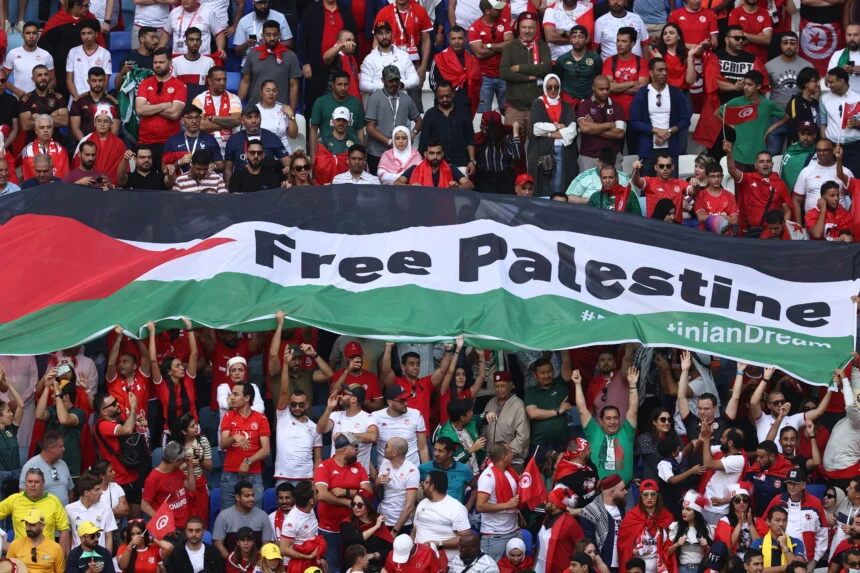As the Israeli-Palestinian conflict is featured prominently during the first FIFA World Cup 2022 to be held on Arab soil, Palestinian flags are flying everywhere in Qatar, but Israeli fans are keeping a low profile.
Despite efforts by certain Arab countries, except Qatar, to normalise relations with Israel, many Arab supporters and some politicians are supporting the Palestinian cause.
A video of a Saudi supporter berating an Israeli TV reporter that was captured by a journalist and has been seen more than 5.4 million times on Twitter is one example of the tense exchanges between Arab supporters and Israeli media that have gone viral.
The fan yells at Moav Vardi, a Kan reporter from Israel, “There is just Palestine, there is no Israel, you are not welcome here.”
While others shout “Long Live Palestine” in front of Israeli television cameras, the Arab fans swarming Qatar have been refusing to talk with Israeli reporters.
Vardi told AFP, “We find it difficult to operate here,” adding that he understood the Arabs’ anger.
Many Qataris have attached the Palestinian flag to the windows of their luxury cars next to their national flag.
While the Palestinian song “Ali Al-Keffiyeh” (Raise Your Keffiyeh) is frequently played in fan zones, some Qataris seated in a VIP part of the stadium were sporting armbands depicting the Palestinian keffiyeh headdress.
Yahya Abu Hantash, a 33-year-old Palestinian residing in Doha, explained that “some foreigners do not know the Palestinian flag and question us about it.”
Abu Hantash, who was brandishing a Palestinian flag and was sporting a Qatar football shirt, said: “This is a perfect opportunity to expose our cause.”
Qatar maintains no links with Israel and has consistently supported the Palestinian quest for independence.
Additionally, the affluent emirate offers crucial financial assistance to Gaza Strip citizens who have been under an Israeli-led blockade since 2007.
The United Arab Emirates, Bahrain, and Morocco are among the Arab countries that have taken steps to normalise their relations with Qatar in 2020. Qatar has criticised these efforts.
Despite the prevalence of Palestinian symbols, one Israeli fan identified only as Haim claimed that this was his first World Cup without his country’s flag. Qatar was the fourth World Cup he had attended.
“I feel like I’m watching the World Cup through a disguise. The environment is hostile toward us “Haim also removed the silver Star of David that ordinarily hangs around his neck.
As part of its “Safe World Cup” campaign, the Israeli government instructed football supporters to conceal Jewish “symbols.”
A charter flight run by a Cypriot low-cost airline brought Haim, 57, and his two kids from the Tel Aviv airport.
According to ambassador Alon Levy, who was in Doha to organise consular coverage, 10,000 Israelis are expected in Qatar for a football competition.
FIFA praised a pact allowing Israelis and Palestinians to fly on exclusive charter flights from Tel Aviv to the Gulf emirate as a platform “to enhance ties throughout the Middle East.”
The direct flights, which will end after the December 18 World Cup final, were allowed only after Qatar requested that Palestinians be permitted to fly alongside Israelis.
Travel authorities reported that no Palestinians were on the first two direct flights, but some were expected on the third trip, which took departure on Tuesday.
In the flights’ agreement with the Palestinian Authority, which is situated in the Israeli-occupied West Bank, “no one” spoke, according to a Palestinian official who asked to remain anonymous. “TV is how we learnt the news.”
Since the 1967 Six-Day War, which Israel fought with Arab nations, Israel has held the Palestinian territories of east Jerusalem and the West Bank under control.
According to the source, the majority of Palestinians travel to Qatar via Jordan or Egypt since Israel severely limits travel to Tel Aviv’s airport.
In Qatar, which has a population of over 2.9 million people, the majority of which is foreigners, there are about 250,000 Palestinians.
Pro-Palestinian support is significant and includes at least tens of thousands of supporters from other Arab countries, such as World Cup participants Saudi Arabia, Tunisia, and Morocco.
A 16-year-old Jordanian named Suhaib Al-Issa said that flying the flag was an act of “peaceful protest to convey our rejection of normalisation with a country that occupies Palestine.”
The treatment of Israeli citizens during the World Cup was not immediately addressed by the Qatari government.












